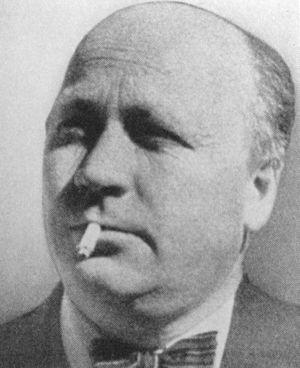Difference between revisions of "Herbert Tingsten"
(description) |
(pro-NATO) |
||
| (One intermediate revision by the same user not shown) | |||
| Line 9: | Line 9: | ||
|death_place= | |death_place= | ||
|constitutes=publisher, academic | |constitutes=publisher, academic | ||
| + | |employment={{job | ||
| + | |title=Dagens Nyheter/Editor-in-chief | ||
| + | |start=1946 | ||
| + | |end=1959 | ||
}} | }} | ||
| + | }} | ||
| + | '''Herbert Tingsten''' was a Swedish editor-in-chief. | ||
| + | |||
| + | ==With us or against us== | ||
| + | "Often, the third position is merely a cover for communist propaganda", Herbert Tingsten wrote in the main editorial of [[Dagens Nyheter]] 17 June 1951. The third position was the view that neutral [[Sweden]] should not take a stand for either of the two great powers, the [[United States]] or the [[Soviet Union]].<ref name=lindelof>https://www.lindelof.nu/en-tredje-standpunkt/</ref> | ||
| + | |||
| + | {{QB|The third position has twice in the course of a few days been presented on the radio by Mr. [[Artur Lundqvist]] and [[Erik Blomberg]]. It is proper that this dissenting opinion may be heard. But it is astonishing that our radio at the same time systematically fails to let the opinion be heard that demands a closer connection to the [[NATO|Western defense organization]]. Only on a few occasions, in the form of a short debate, is there knowledge that such a view exists. It is all too well known that the government does not want information and discussion about this problem - while in any case the government body considers the third position worth propagating in a lot of articles. The radio's compliance is as clear as it is unpleasant.”<ref name=lindelof/>}} | ||
| + | |||
{{SMWDocs}} | {{SMWDocs}} | ||
==References== | ==References== | ||
{{reflist}} | {{reflist}} | ||
{{Stub}} | {{Stub}} | ||
Latest revision as of 01:26, 3 April 2022
(publisher, academic) | |
|---|---|
 | |
| Born | 17 March 1896 |
| Died | 26 December 1973 (Age 77) |
| Nationality | Swedish |
| Member of | Mont Pelerin Society |
Herbert Tingsten was a Swedish editor-in-chief.
With us or against us
"Often, the third position is merely a cover for communist propaganda", Herbert Tingsten wrote in the main editorial of Dagens Nyheter 17 June 1951. The third position was the view that neutral Sweden should not take a stand for either of the two great powers, the United States or the Soviet Union.[1]
The third position has twice in the course of a few days been presented on the radio by Mr. Artur Lundqvist and Erik Blomberg. It is proper that this dissenting opinion may be heard. But it is astonishing that our radio at the same time systematically fails to let the opinion be heard that demands a closer connection to the Western defense organization. Only on a few occasions, in the form of a short debate, is there knowledge that such a view exists. It is all too well known that the government does not want information and discussion about this problem - while in any case the government body considers the third position worth propagating in a lot of articles. The radio's compliance is as clear as it is unpleasant.”[1]
Events Participated in
| Event | Start | End | Location(s) | Description |
|---|---|---|---|---|
| 1948 Hague Congress | 7 May 1948 | 11 May 1948 | Netherlands The Hague | Landmark conference which had a profound influence on the shape of the European Movement. Many of the groups organizing the conference received covert funding from the CIA. |
| Bilderberg/1954 | 29 May 1954 | 31 May 1954 | Netherlands Hotel Bilderberg Oosterbeek | The first Bilderberg meeting, attended by 68 men from Europe and the US, including 20 businessmen, 25 politicians, 5 financiers & 4 academics. |
| Bilderberg/1955 September | 23 September 1955 | 25 September 1955 | Germany Bavaria Garmisch-Partenkirchen | The third Bilderberg, in West Germany. The subject of a report by Der Spiegel which inspired a heavy blackout of subsequent meetings. |
| Bilderberg/1956 | 11 May 1956 | 13 May 1956 | Denmark Fredensborg | The 4th Bilderberg meeting, with 147 guests, in contrast to the generally smaller meetings of the 1950s. Has two Bilderberg meetings in the years before and after |